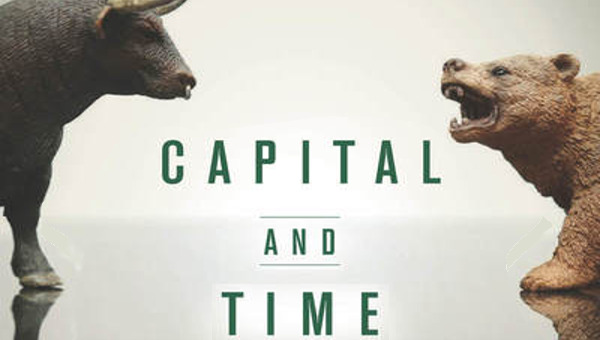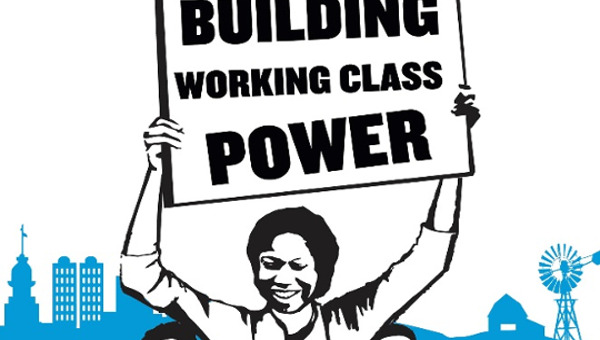Looking for Solutions: Labour and the Crisis of Neoliberal Capitalism
The current financial turmoil besetting the world market and the Canadian economy has set in motion an intense struggle for solutions. The main policies that have come forward from the major capitalist states of the world are vigorous attempts to reconstruct neoliberal capitalism and financial markets. A few alternatives have called for a more ‘regulated’ capitalism that would repress some dimensions of today’s financial markets while still maintaining the general economic order formed in the period of neoliberalism and globalization. In both cases, taxpayers and the working classes are expected to pay for the horrific excesses of the financial markets and the capitalist classes, under the astonishing assertion that the rest of us cannot live without either of them.
This Bullet begins with an article by Ingo Schmidt laying out some of the debates within labour movements, in the past and today, about economic alternatives. It raises the question of how North American labour movements can begin a process of struggle to form alternative solutions after years of setbacks at the very hands of neoliberalism and financial markets. It follows with two contributions towards such a process. One is an open letter from labour scholars that suggests to union leaders and rank-and-file activists that there is a need to prepare for a struggle against lay-offs, wage concessions and cuts in pensions and public services that will be promoted once the crisis on the financial markets impacts the rest of the economy. The second is a resolution promoting such action and the educational activities necessary for its success that was passed by the Vancouver and District Labour Council at its October 2008 meeting.
Looking for Solutions: Labour and the Crisis of Neoliberal Capitalism
For three decades after the Second World War, the ideas of British economist John Maynard Keynes provided the intellectual backbone of trade unions in Western developed countries like Canada. Unionists maintained their affinity with Keynes, despite his declaration that “class war will find me on the side of the educated bourgeoisie.” This affinity remained intact even during the dark ages of neoliberalism that superseded the postwar era of enlightened welfare capitalism.
In the context of the current crisis, with bankers and bosses abandoning their neoliberal beliefs and flocking to large-scale state intervention, union economists who never gave up on Keynes see their chances again. They hope that Keynes’ defense of union activity against liberal and neoliberal anti-union attitudes will find more of an audience than it did when the belief in free markets reigned supreme. The rationale for such hopes is provided by the collision between neoliberal postulates and the need for state intervention in the context of the current crisis. The theoretical attraction that Keynes holds for trade unions is his argument that wage cuts are not, as liberal and neoliberal economists suggest, a remedy to overcome crisis.
The Keynesian Case Against Wage-Cutting in Crises
According to Keynes, lower wages may lead to lower prices because companies are under severe competitive pressure. As a result, buyers will expect future price reductions and thus postpone their purchases, reducing aggregate demand and therefore employment. To the extent that wage cuts do not translate into price cuts of the same magnitude, however, they lead to lower real wages, lowering the purchasing power of working class households. The effect is the same either way: decreases in aggregate demand and employment can turn a cyclical recession into a depression with devastating social consequences.
The political implications of this analysis are clear: wage cuts must be avoided if the desire is to prevent locking in conditions that will generate a downward spiral of wages, prices, aggregate demand and employment (a point that Karl Marx had also earlier made). Unions are the social agent capable of performing a stabilizing function by resisting wage cuts. In Keynes words: “Every trade union will put up some resistance to a cut in money-wages, however small.” Those seeking to avoid a deterioration of recession into depression by means of maintaining wages, however, would also support government spending to overcome the lack of aggregate demand that caused the recession in the first place. Keynes devoted almost all of his General Theory of Employment, Interest and Money (1936) to making an argument for the use of fiscal policies as a remedy for economic crisis.
The Limits of the Keynesian Case
Politically, Keynes’ suggested strategy rests on trade unions that are able and willing to resist wage cuts in times of crises and governments that are willing to use deficit spending as a means of raising the economy out of a slump. None of these conditions holds today. Canadian unions, like their counterparts in most other developed countries, were on the defensive from neoliberal policies of wage restraint and fiscal austerity long before the crisis hit. Struggling with hostile employers – whose anti-union repertoire includes shutting down locations where workers are involved in organizing drives, to back-to-work legislation against public sector strikers, the re-organization of work processes and the deployment of organizational forms that are resistant to the control of industrial and craft unionism – unions were pushed back and forced to accept concession bargaining. Thus, they may not be in a position to successfully resist employers’ pressure for wage-cuts.
Recent union organizing drives, such as those of the SEIU and UNITE-HERE or living wage campaigns such as that of the HEU in British Columbia, valuable and important as they are, haven’t generated enough successes to allow unions to negotiate the kind of sectoral wage agreements that would be essential to a Keynesian counter-crisis strategy. Such negotiations are further hampered by the extremely fragmented bargaining structure that exists in Canada. Even significant membership gains wouldn’t change the fact that collective bargaining is conducted in myriads of bargaining units among which there is little or no cooperation. Such cooperation, via centralized or pattern bargaining, would be required to negotiate wages for workers in Canada in such a way that labour’s share of national income could be defended or increased at the expense of the share going to corporate profits.
Generating sufficient bargaining power is not simply a question of increasing union membership, cooperation and re-organization. It also depends on the engagement of the rank-and-file. Certain layers of the working class (and this is more true for unionized than non-unionized workers), are not only workers but also stakeholders. They own houses, have access to consumer credit and have their retirement savings invested in stock markets. While they are small fish compared to big money, it is precisely for this reason that they are suspicious of any economic policy that might endanger their stakes, however small. Consequently, they are open to those who promise to defend these stakes. Ultimately, the question these workers are facing is whether they believe their future will be better secured by doing what is necessary to remain members of the diminishing group of small stakeholders that allies itself with the propertied classes or by making common cause with the property-less workers who have a great deal to gain from unionization and increased social protection.
Organizing the unorganized, coordinated or centralized bargaining and coalitions with activists who work in the lowest rungs of the working class are not the only prerequisites to successfully pursue Keynesian reform policies but also more radical policies necessary to address underlying distributional and class inequalities. Such policies also require a labour presence in the political arena. At this time, there is little of such presence in existence. Admittedly, many union leaders and members (certainly not by all) see the NDP as labour’s representation in parliament. During elections, many politicians employ a rhetoric that makes them sound very progressive.
However, neither hopes for the NDP nor all-party appeals to hard working people can conceal the fact that labour has hardly any stakes in the existing political-economic system. Workers in the Soviet empire were told that five-year-plans in their centrally planned economy would bring them closer to a workers’ paradise. Workers in the empire of capital are told that tax breaks and balanced budget will pave the way to a stakeholder paradise in which differences between bosses and workers evaporate. Though the credibility of such neoliberal promises has been damaged by the current crisis, they still impact economic policies.
Thus, breaking away from the neoliberal ideas that have achieved the status of a popular religion since the 1970s, when the political and propertied classes abandoned their postwar deal with trade unions, social democracy and Keynesianism is difficult for everyone, from the boardrooms of the rich and powerful to the street corners where the downtrodden congregate. From this angle it could be argued that today’s question is not so much whether Keynes will have a comeback after the neoliberal age, no matter how inspiring his ideas are intellectually, but how to get people involved in a collective search for ideas and policies to stop efforts by big capital to shift the burden of the current crisis onto the shoulders of the working class and the poor.
The Comeback of Marx’s Ideas
Regarding the unfolding struggle over the distribution of the crisis burden, another author who is having a comeback these days might offer some guidance. Karl Marx, whose main work Capital (1867) [available on the Marxists.org website] finds more readers by the day, has much more to say about the conflict of interest between capitalists and workers, including the subsections of either of these classes, than Keynes. The latter was well aware of the existence of social classes. In order to maintain capitalism during times of severe crisis, such as the Great Depression, he considered a deal between the working class and the capitalist class necessary; a deal that would create jobs and secure wages for workers and profits for capitalists. In order to strike such a deal, Keynes, who also had served in the field of economic diplomacy, focused on class cooperation more than on class conflict. Not so Marx. A political émigré in Britain who mostly lived on money that his bourgeois friend Friedrich Engels donated to him, he had not much to lose and was therefore free to think about ways to win a world.
In doing so, he made clear that only during economically good times the conflict over wages, working hours and working conditions on one side and profits and capital accumulation on the other could be tamed. Such conditions were envisioned by Keynes in the 1930s and became true, in parts of the world, after WW II. However, the moment of prosperity and welfare capitalism was already passing in the 1970s. It was replaced by a thirty year period of slower real economic growth, unemployment, shifts from wages to profits and an explosion of debt and paper wealth. The current crisis marks the end of this period.
In order to save at least parts of the wealth illusions that financial markets produced before the crisis, enormous quests for tax dollars were recently made and approved by rich countries’ governments. So far, this bailout money is largely a government promise to shareholders, particularly the big ones, to compensate them for their speculative loses. But the bills for these bailouts will certainly be presented to the working class. Further cuts in public services, higher taxes on low incomes and maybe even inflation to destroy all financial illusions until wealth is only represented by land and the physical means of production are means to achieve this goal. The owners of these means, who see their profits declining in the course of the crisis, will join governments’ onslaught on the working class with lay-offs for some workers and speed-ups along with wage cuts for those who can keep their jobs. If things are heading in this direction, it may be a good idea to look up some of Marx’s ideas instead of those of Keynes.
Marx not only explained why the pursuit of profit doesn’t lead to general prosperity, but also why it leads to economic crisis and social devastation. He also took a close look at the making and unmaking of working classes. Any time that workers in a particular industry had found ways to improve their conditions, Marx noted, capitalists operating in these industries would either re-organize work, seek government support to lower legal standards and/or put their money into different locations or industries to restore profits. Thus, the working class has always been in flux, no matter that some images of banner-carrying and fist-raising workers suggest otherwise.
Today’s difficulties of finding effective ways to organize are not new: they are a recurrent theme in the history of labour and socialist movements. They go hand in hand with the search for ideas, policies and campaigns that will advance the class struggle and address inequalities in the present, while building workers’ collective capacities for self-development for the future. These struggles are essential to setting out a vision of feasible alternative social orders, indeed the remaking of socialism as a viable political project, to the financial and economic turmoil we have again been so violently subjected to. •
Open Letter from Labour Scholars on the Economic Crisis
Brothers and sisters,
More than a year ago, an unprecedented housing boom in the US went bust, triggering a financial crisis that has recently led to large-scale bank failures and enormous government bailouts. This crisis affects not just the financial markets and not just the US. Banks are failing in Europe and in Latin America, as well. Stock markets are plummeting around the world. Governments have bailed out banks in many European countries. Central banks are pouring vast amounts of money into financial circuits that have been deserted by private credit. Moreover, growth is slowing dramatically. Economic activity has actually reached recession levels in a number of countries, and unemployment rates are rising.
The first sector of the Canadian economy that was hit by this crisis was manufacturing. A wave of speculation in resource prices, propelled by money fleeing the plummeting housing and financial markets, pushed the Canadian dollar up sharply and, in turn, drove exports and jobs in export industries down. Though this short-lived boom in resources is already over, the manufacturing jobs that have been lost there won’t be coming back. Instead, we are seeing job losses spreading to other sectors. As is the case in many other countries, Canada is on the brink of recession. Moreover, falling stock prices and a severe tightening of credit indicate that the financial crisis is spilling over from Wall Street to Bay Street.
Given the firm grip that profits-first and balanced-budget dogmas have over Parliament Hill and the Bank of Canada, our politicians’ reaction to Bay Street calamities is easy to imagine: throw tax dollars and credit at financial investors to cover their losses while gutting public services and jobs to avoid budget deficits. Such misguided policies are a sure recipe to push an economy that is already ailing into deep recession or even depression. More lay-offs, wage cuts and the evaporation of private and public sector pension plans will follow.
The large-scale interventions that we have already seen in the US and Europe, and we can expect to see in Canada soon, are fundamentally at odds with free market propaganda, which provided an ideological cover for an unprecedented accumulation of profit and wealth in the hands of the few at the expense of the many. Working people who created this wealth by the sweat of their brows and the effort of their brains, and who are now destined to carry the burden of the crisis, will see the fruits of their labour benefit no one but the people on Bay Street. While the breadth and depth of this crisis should not be minimized, it can also provide an opening for very necessary economic and social change. And organized labour can significantly contribute towards such change.
We, the signatories, urge that:
- Unions make a major effort to inform their members as well as non-union workers about the economic situation. Undermining the legitimacy of free market ideology is a precondition for a struggle for progressive change that can benefit everyone. Discussion and understanding of economic developments are others. Educationals on the current economic situation are an important contribution to develop workers’ capacities to successfully engage in union struggles.
- Unions prepare and lead actions against lay-offs, spending cuts and concessions. Such actions are essential if we are to prevent Bay Street from placing the burden of the crisis on the residents of Main Street.
- Unions help to build activist coalitions that can engage in economic issues beyond the workplace and collective bargaining. Such coalitions should plan and mobilize for demonstrations that claim public control over the financial sector and a major remake of fiscal policies from bailing out private banks towards policies for jobs, social justice and ecological sustainability.
- Unions that are involved in the management of pension funds should inform their members about the state of these funds and develop strategies to their members’ pensions. Such strategies could play an important role in a fundamental redirection of fiscal policies, away from balanced-budget dogmas – which cause fiscal transfers that place the weight of financial burdens on those at the bottom – towards taxing the rich in order to expand public services and create universal social programs and protections, including publicly-funded pensions, childcare and post-secondary education.
Greg Albo, York University
Bryan Evans, Ryerson University
Ingo Schmidt, Athabasca University
David Camfield, University of Manitoba
Étienne Cantin, Université Laval
Sam Gindin, York University
Cy Gonick, University of Manitoba
Adam Hanieh, York University
Jerry Kachur, University of Alberta
Dennis Pilon, University of Victoria
Chris Roberts, Professional Institute of the Public Service of Canada
Richard Roman, University of Toronto (retired)
Stephanie Ross, York University
Edward H. Shaffer, University of Alberta (retired)
Sid Shniad, Research Director, Telecommunications Workers Union
Global Financial Crisis
Resolution passed by the Vancouver and District Labour Council
October 21, 2008
BECAUSE the global financial crisis is triggering an economic recession, which may ultimately spread to the Canadian economy affecting many workers and their families, and
BECAUSE the “free market” program of privatization, de-regulation and globalization has so clearly failed workers and their families; and
BECAUSE unregulated market greed and excess are the causes of the current financial crisis and could provide a basis for necessary economic reform and social change if the lessons are properly learned and understood,
THE VANCOUVER & DISTRICT LABOUR COUNCIL WILL:
1. organize educational events and seminars to help workers and the public to understand the current economic situation and develop progressive solutions, and
2. fight any attempt to put the burden of this crisis onto workers’ shoulders; and
3. organize coordinated support for the unions that are targeted, if asked to do so by those unions, and promote coalitions between unions and social justice groups to push for the necessary economic and social change to prevent this happening again.
This is the amended resolution passed by the Vancouver and District Labour Council on Oct. 21, 2008. The amendment to point 3 “organize coordinated support for the unions that are targeted, if asked to do so by those unions,” was added after the following speech by Rachel Tutte, who is a VDLC delegate for the Health Science Association of British Columbia:
“Let me read a couple of things for you. First, from the CLC Constitution:
“We are sisters and brothers who, in solidarity, always pursue social, economic and political justice” and we “coordinate the efforts of affiliates”. Next, from the CUPE National statement on the financial crisis, “the great value of belonging to a union and working in solidarity with others to protect jobs, living standards, and to build a better economic system should become ever more apparent”, “we need to forcefully oppose their policies” and “use every opportunity to push for measures that will provide for greater economic stability and a better quality of life for all.” Lastly, from the VDLC webpage titled Who We Are, “to assist unions on strike” and “to organize political action”.
The breadth and depth of this crisis provides an opening for necessary economic and social change. But the global neoliberal crowd wants to use this opening, too. Naomi Klein calls it “Disaster Capitalism”. The EU’s Brown, Sarkozy and Merkel are at this moment talking about the need to re-design the world financial system. That this is an opportunity to create new rules for our global economy and build a new international economic order. They want to convene a second Bretton Woods conference. Well, out of the first Bretton Woods we got the IMF, the World Bank, the WTO, all things that have contributed to the mess we are in now. This is really scary stuff!
Unions must work together, lead actions against lay-offs, cuts to public services, and concessions. We must use every opportunity to push for measures that will build a better economic system that supports jobs, social justice, and ecological sustainability. That is why I believe we need this amendment. We need to do more than just promote coalitions between unions and social justice groups. We need to find ways for unions to support other unions, and for unions to support non-unionized workers. The situation is critical and we must come together and support each other.” •





